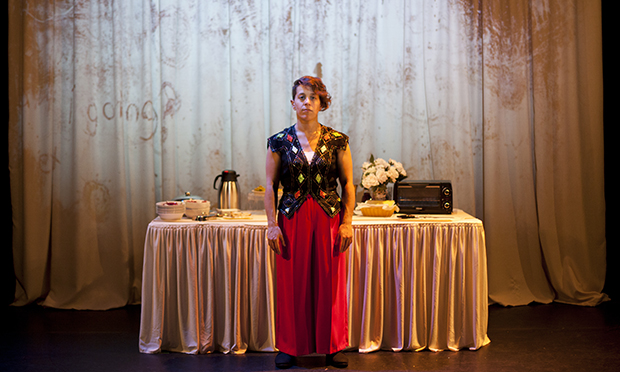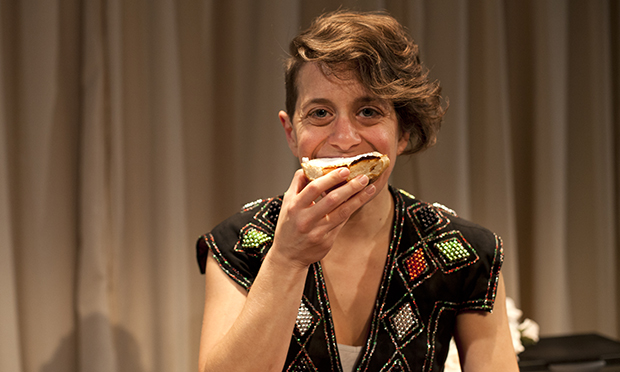Holocaust Brunch, Artsdepot, stage review: ‘Humour and food open up traumatic history for a modern audience’

As we enter the theatre, we pass a row of prints from Yael Roberts’s ‘trauma documents’ series, and then we are offered a beigel spread with cream cheese.
The incongruity is jarring – both the beauty of the prints and their subject matter, and the contrast between the psychological engagement demanded by the art and the everyday normality of tasty baked goods.
These contrasts recur throughout Holocaust Brunch, Tamara Micner’s one-woman show that employs humour, audience engagement and cocktails to explore the inherited trauma of Jewish people.
The play, which premiered on 17 October at the Artsdepot in North Finchley, is the first solo venture for this Hackney-based performer and script writer.
Narrated in the first-person, the show edges toward its theme as Micner tells how she had long been a ‘Holocaust avoider’ in a Canadian-Jewish family of ‘Holocaust addicts’ whose social activities often involve the collective tragedy of the Second World War.

Photograph: Holly Revell
But when the history of a family not dissimilar to her own falls into her lap, Micner begins to engage with the subject matter she has long shied away from.
The story she recounts is that of Bluma and Isaac, who meet in 1942 at medical school in the Soviet Union, having fled persecution in what was then Poland.
Following the war, they find their way back west to families and communities that have been decimated, and ultimately they opt to settle in Canada.
The story of Bluma and Isaac skirts round the concentration camps, which they were luckily spared, and its account of the war-time Soviet experience is a less common theme in the stories with which Western audiences will be most familiar.
This ‘different’ Holocaust is perhaps for this reason easier to tell and easier to hear. The scars are no less real, but the combination of everyday social devices and temporal distance are effective in making us think anew about a topic that no-one can afford to forget.
For virtually all of us, the Holocaust is both familiar and utterly incomprehensible. We have learnt the history, perhaps visited some of the museums, memorial and places, but we struggle to get to grips with events so monstrous.
The narrative devices of humour, food and games are thus useful means of relating to audiences and opening up a conversation about what the Holocaust means today, to both Jewish and non-Jewish people.
Holocaust Brunch premiered on 17 October at Artsdepot, 5 Nether Street, North Finchley, N12 0GA.
